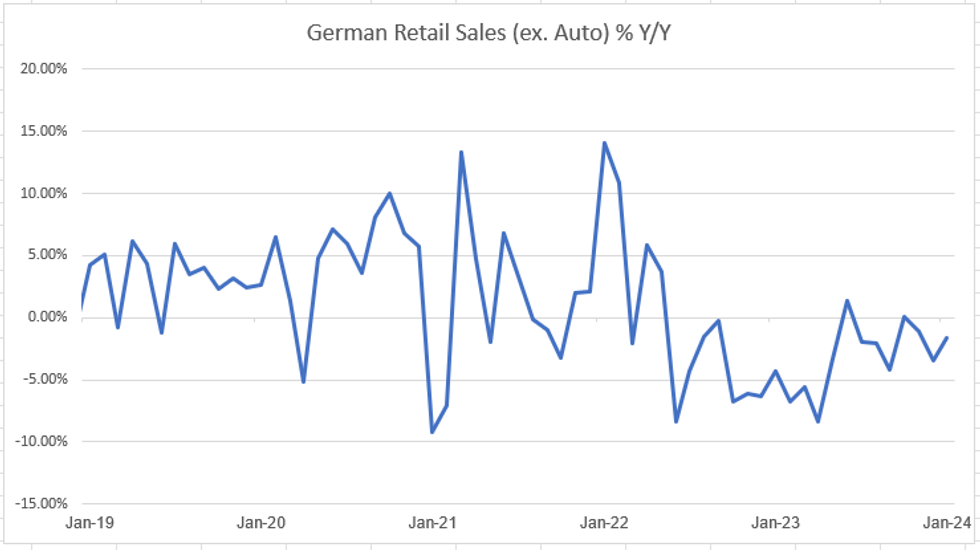-
Policy
Policy
Exclusive interviews with leading policymakers that convey the true policy message that impacts markets.
LATEST FROM POLICY: -
EM Policy
EM Policy
Exclusive interviews with leading policymakers that convey the true policy message that impacts markets.
LATEST FROM EM POLICY: -
G10 Markets
G10 Markets
Real-time insight on key fixed income and fx markets.
Launch MNI PodcastsFixed IncomeFI Markets AnalysisCentral Bank PreviewsFI PiFixed Income Technical AnalysisUS$ Credit Supply PipelineGilt Week AheadGlobal IssuanceEurozoneUKUSDeep DiveGlobal Issuance CalendarsEZ/UK Bond Auction CalendarEZ/UK T-bill Auction CalendarUS Treasury Auction CalendarPolitical RiskMNI Political Risk AnalysisMNI Political Risk - US Daily BriefMNI Political Risk - The week AheadElection Previews -
Emerging Markets
Emerging Markets
Real-time insight of emerging markets in CEMEA, Asia and LatAm region
-
Commodities
-
Credit
Credit
Real time insight of credit markets
-
Data
-
Global Macro
Global Macro
Actionable insight on monetary policy, balance sheet and inflation with focus on global issuance. Analysis on key political risk impacting the global markets.
Global MacroDM Central Bank PreviewsDM Central Bank ReviewsEM Central Bank PreviewsEM Central Bank ReviewsBalance Sheet AnalysisData AnalysisEurozone DataUK DataUS DataAPAC DataInflation InsightEmployment InsightGlobal IssuanceEurozoneUKUSDeep DiveGlobal Issuance Calendars EZ/UK Bond Auction Calendar EZ/UK T-bill Auction Calendar US Treasury Auction Calendar Global Macro Weekly -
About Us
To read the full story
Sign up now for free trial access to this content.
Please enter your details below.
Why MNI
MNI is the leading provider
of intelligence and analysis on the Global Fixed Income, Foreign Exchange and Energy markets. We use an innovative combination of real-time analysis, deep fundamental research and journalism to provide unique and actionable insights for traders and investors. Our "All signal, no noise" approach drives an intelligence service that is succinct and timely, which is highly regarded by our time constrained client base.Our Head Office is in London with offices in Chicago, Washington and Beijing, as well as an on the ground presence in other major financial centres across the world.
Real-time Actionable Insight
Get the latest on Central Bank Policy and FX & FI Markets to help inform both your strategic and tactical decision-making.
Free AccessMNI POLITICAL RISK - Trump Announces Raft Of Key Nominations
BRIEF: EU-Mercosur Deal In Final Negotiations - EC
MNI BRIEF: Limited Economic Impact Of French Crisis - EC
MNI US MARKETS ANALYSIS - Ouster of Barnier Leaves Little Dent
Weak Start To 2024 For Retail Sales Points To Struggling Consumption
German retail sales were slightly weaker in January than expected at -0.4% M/M (seasonally- and calendar-adjusted, vs +0.5% cons), though the soft outturn partially reflected a base effect from a large upward revision to December (-0.5% prior, revised from -1.6%). The Y/Y print (which is calculated on an ex-auto sales basis) was basically in line at -1.6% Y/Y (-1.7% cons; -3.4% prior, revised from -4.4%).
- Overall, the data - which are in real terms - suggests that conditions in German retail remain very weak though are not deteriorating rapidly. For perspective, the yearly rate has printed flat or negative for 7 consecutive months now and 16 of the past 18 - and the weakness continues to be very broad based across the major retail categories.
- The yearly decline was driven by non-food items, which printed -2.3% Y/Y (vs -4.4% prior). Sales in the furnishings, household appliances and building supplies category continued their particularly strong decline, at -7.7% Y/Y (vs -9.2% prior) after printing in negative territory in every month of 2023.
- Within the non-food sector, pharmacies, cosmetic, pharmaceutical and medical products saw the strongest developments at +1.5% Y/Y (vs -2.4% prior).
- Food items came in at -0.4% Y/Y (vs -1.5% prior), driven lower by speciality food retail (-0.8% Y/Y vs -4.0% prior) as opposed to conventional food retail (supermarkets etc., -0.3% Y/Y vs -1.3% prior), suggesting a shift towards lower-cost retail options might be ongoing in Germany.
- The upward revisions of December data slightly improve the picture of weak 2023 Christmas sales, and come after the stronger-than-expected private consumption data from the Q4 2023 GDP release (priv. cons. +0.2pp positive contribution and upward revision for Q3, from slightly negative to a +0.1pp contribution).
 MNI, Destatis
MNI, Destatis
To read the full story
Sign up now for free trial access to this content.
Please enter your details below.
Why MNI
MNI is the leading provider
of intelligence and analysis on the Global Fixed Income, Foreign Exchange and Energy markets. We use an innovative combination of real-time analysis, deep fundamental research and journalism to provide unique and actionable insights for traders and investors. Our "All signal, no noise" approach drives an intelligence service that is succinct and timely, which is highly regarded by our time constrained client base.Our Head Office is in London with offices in Chicago, Washington and Beijing, as well as an on the ground presence in other major financial centres across the world.
